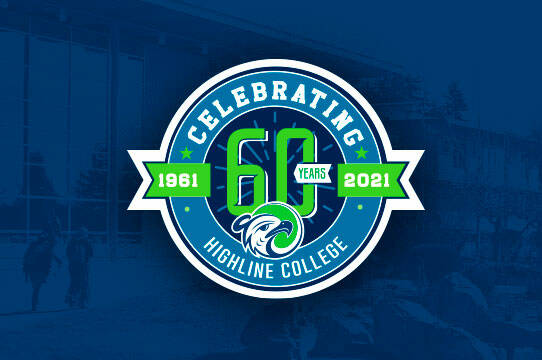From its humble beginnings at a high school campus in 1961 to an expanding presence in the community on top of an 80-acre college campus in 2021, Highline College in Des Moines has seen its fair share of change in the last 60 years.
Its first 385 students have now grown to more than 350,000 alumni.
Highline, its students, and its alumni added $600-million-plus in income to the King County economy during fiscal year 2014-15, the most recent year studied.
And the college has undergone a transformation in almost every aspect, according to a college media release. The educational programs and careers students pursue have evolved in addition to the types of degrees Highline offers, which include more than 120 different certificates, associate and Bachelor of Applied Science degrees. Then there’s the advanced technology the college has adapted to meet students where they’re at in their educational goals, both online and in person.
To celebrate this 60-year transformation, Highline College will kick off its 60th anniversary with a series of events throughout the upcoming 2021-2022 academic year, which begins Sept. 27. More information about those events will be available at highline.edu.
“A lot has changed since the 1960s, including Highline College,” said John Mosby, president of Highline College. “But as we celebrate today and look to the future, I know one part of Highline will never change, and that’s its commitment to serving our incredible students.”
While that commitment has been steadfast and will continue to hold true in the future, the college’s changing student demographic is actually what has helped form Highline College into what it is today –– the most diverse college in Washington state with a strong commitment to social justice, according to the college media release.
Dating back to its beginnings, founding faculty were instrumental in leading the college’s pathway toward its foundational values. In the 1990s, those values became a tangible plan, which included an initiative that the college would create a climate that values diversity and enhances global perspectives.
Highline’s equity and diversity awards in recent years only scratch the surface in recognizing the work that’s been done behind the scenes and continues to be worked on. From its upcoming Equity First strategic planning to daily classroom teachings, diversity, equity and inclusion continue to be at the core of what makes Highline Highline.
Looking forward, Highline College will celebrate its expansion into the City of Federal Way with the opening of The Hub: Federal Way Higher Education Center, located at 1615 S. 325th St., in September, and welcomes the positive changes that will come with the construction of Sound Transit’s Federal Way Link Extension, which will be open for service in 2024.
The light rail project will increase access to Highline’s campus by adding an affordable transportation option via link light rail for students living as far north as Seattle and as far south as The Hub’s location in Federal Way. It will also increase educational opportunities by providing direct access to the University of Washington for Highline graduates who live in the South King County region.
Timeline
1959: A Highline School District citizens’ committee began studying the need for a local junior college. The committee and district set out to prove the area’s need by establishing an extended secondary program — the first step toward a two-year college — by offering post-high school classes at Highline High School.
1961: Highline College became the first community college in King County and welcomed 385 students to portable classrooms at Glacier High School, a temporary location until the college’s campus opened in 1964.
1962: Melvin “Pat” Allan became Highline’s first permanent president.
1964: Highline moved to its present location at South 240th Street and Pacific Highway South, a tree-filled 80-acre hillside overlooking Puget Sound and the Olympic Mountains.
1976: Shirley B. Gordon, who would later have a Des Moines park named in her honor, became Highline’s third permanent president, making her the first female to lead the college and, at the time, the only female president of a publicly-funded college in the state. Dr. Gordon was one of Highline’s first three founding faculty members and instrumental in the college’s establishment.
1984: Des Moines annexed land south of its original city limits, an area known as Midway, including the Highline College campus.
2003: The MaST Center officially opened as a learning center on Redondo Beach Drive, building on its prior use as a facility for research and a biology lab from the 1990s to 2003. It was also the site of Highline’s Undersea Diving Program from the 1960s to the 1990s.
2016: Highline graduated one of its largest classes at 2,300 students, adding to the more than 350,000 who have attended Highline.
2018: John R. Mosby became the first Highline president of color.
2019: Campus View student housing became available through a public-private partnership supported by the City of Des Moines.
2020: Highline College successfully pivoted to remote learning in the midst of the COVID-19 pandemic
2021: Highline College will launch its Equity First strategic planning in addition to opening The Hub: Federal Way Higher Education Center in September 2021.
Talk to us
Please share your story tips by emailing editor@kentreporter.com.
To share your opinion for publication, submit a letter through our website https://www.kentreporter.com/submit-letter/. Include your name, address and daytime phone number. (We’ll only publish your name and hometown.) Please keep letters to 300 words or less.

